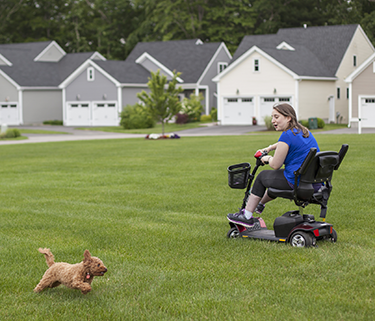By Wendy H. Sheinberg, CELA
Moving to another state is a challenge for most families. If a family member has a disability, that challenge is even greater, as it often requires figuring out how to transfer disability benefits to another state. State benefit programs vary, and states administer federal programs at the local level making it even more complex. When a member of your family has a disability, it pays to do plenty of upfront research and to construct a “safety net” to protect against unanticipated gaps in service, problems and delays.
Transferring SSI From State to State & Other Social Security Disability Benefits
If you inform the Social Security Administration of your new address early, there should be no disruption to your Supplemental Security Income (SSI) or other Social Security disability benefits. However, the amount of your monthly SSI payment could change, since it has both federal and state components. There will be no difference in Social Security disability benefits, based on work history of the individual or their parent.
Medicaid Eligibility and Waivers
While Medicaid eligibility is based on federal law, the eligibility standards, services, and support available through Medicaid waivers vary dramatically between states. These services include case management, residential services, employment services, and other non-residential services. An important consideration is that many states have years-long waiting lists for home and community-based services, and new residents must reapply and go to the end of the line.
Health Care
Over the years, you have probably spent considerable time scouting for doctors, therapists, and other service providers to meet your loved one’s specific needs. Be prepared to start over.
First, there’s the question of insurance. If you have a private policy, perhaps through an employer, moving to a new state may mean a new policy with different coverage or different premiums. If you have purchased coverage under the Affordable Care Act (ACA) through a state insurance exchange, you will need to learn what is available in the new location. ACA typically provides for a 60-day special enrollment period when a permanent move requires a change in health plan. To be safe, check on eligibility requirements early.
Medicaid is even more complicated, since you must reapply once you have moved. It can take anywhere from 15 to 90 days for approval to come through, although coverage will be retroactive. In the meantime, you will need to make other arrangements to handle critical needs.
Medicare is a federal program. Moving to a new state should not affect Medicare benefits. However, it is important to review and confirm that your Medicare supplemental policy and your prescription drug plan provide coverage in the new state.
Once you understand how you will be paying for health care, you will need to determine what resources are available. Local advocacy groups─ such as chapters of The Arc─ will likely be a source for advice and referrals. To minimize disruptions, establish as much of your new provider network as possible ahead of time.
Interview early intervention services and doctors before you relocate—ideally face-to-face, or by traditional or video teleconference, if necessary. Have medical records sent ahead to new physicians and schedule visits as soon as possible once you’ve moved. Ask your new insurance provider to pre-authorize prescriptions, and bring at least a 30-day supply of important medications with you.
Special Education Services
While the Individuals with Disabilities Education Act (IDEA) requires your new school district to provide services and supports comparable to those provided in the existing Individualized Education Program (IEP), you may have to renegotiate the IEP. Additionally, a 504 plan or other modified curriculum may also require renegotiation. The good news is that your existing records should provide a strong foundation for new discussions. In fact, if it’s time for the current plan to be updated, do so before the move so that your assessments and supporting materials are as current as possible. It can be hard to get school files during the summer, if you are moving during the summer, be sure to get the needed copies before classes end.
For military families, who generally relocate every few years, this is a recurring problem. Check out the Department of Defense’s special ed checklist.
Decision-Making Supports and Guardianship
Decision-making support can vary from state to state. If your adult child has executed a power of attorney, health care proxy or a supported decision-making agreement, consult with a special needs attorney in the new state to confirm their validity.
If your family member has a court-appointed guardian, you should consult a special needs attorney in both locations to understand your particular situation. Some states require that the guardian obtain court approval before the person under guardianship moves to another jurisdiction. You may also want to take this opportunity to explore a less restrictive means of providing support in the new state.
Many states do not recognize guardianships granted elsewhere. Unless both states have signed a reciprocity agreement, you could face different definitions of capacity, restrictions on a guardian’s role and more. Even if your new state will recognize a guardianship originated in your home state, most uniform guardianship statutes require some form of filing with the court in the new state.
SNAP (Food Stamps)
Check regulations in your new home state ahead of time, since there are differences in how this federal program is implemented locally. In some areas, there are significant asset limits for people with disabilities.
Social Service Agencies
Day care, in-home services, social programs, career assistance and other supports vary greatly from state to state. Do your research well in advance to understand what awaits you.
Housing Assistance
- Home Ownership: Accessibility features may be high on your list, and it could be necessary to make alterations to your new residence. Architects or housing planners may be willing to view properties on your behalf and to advise on costs, which can differ sharply from state to state.
- Section 8 vouchers: This is a national rent subsidy program, so if you already have a voucher, it will be recognized anywhere in the U.S. However, you will be responsible for letting your current Public Housing Authority know that you wish to move, working with the Public Housing Authority in your new area to locate your own housing, and terminating your current lease in accordance with its terms. “Portability” in Section 8 housing is very complicated and there are many pitfalls. See: https://portal.hud.gov/hudportal/documents/huddoc?id=DOC_35623.pdf
Special Needs Trusts
Have any special needs trusts (SNTs) checked by a special needs attorney in your new home state as soon as possible, since it may be necessary to have technical corrections/amendments made.
ABLE Savings Accounts
At this writing, 46 out of 51 states have enacted ABLE Act legislation, and many states are beginning to launch their ABLE programs. The original ABLE account legislation required the creation of the ABLE account in the individual’s state of residence. The December 15, 2015, amendment of the Able Act, as part of the Tax Extenders Package, removed the residency requirement. If the individual moves to a new state, the move will not affect the validity of the existing ABLE account. When moving, it is important to remember that each individual may only have one ABLE account. While you do not have to open a new account in the new state, if you decide to have a local account, be sure to follow all procedures to transfer the account so that there is only one account in existence.
Disability Parking Permits
To avoid delays in obtaining a disability-parking permit, try to register cars and vans ahead of time by having a family member relocate early. You’d be surprised how long this can take in some states.
The regulations and paperwork involved in crossing state lines can be dizzying. Delays and omissions can have serious repercussions for your loved one’s quality of life. Unfortunately, there’s no way to make this process easy, but if you begin planning early, you can lower your family’s stress level.
Think about keeping a binder with important documents that you update each year. Another option is scanning and filing documents online in a “cloud” account, which will save you from combing through boxes upon arrival in your new home.
The Special Needs Alliance (SNA) is a national non-profit comprised of attorneys who assist individuals with special needs, their families, and the professionals who serve them. SNA is partnering with The Arc to provide educational resources, build public awareness, and advocate for policies on behalf of people with intellectual/developmental disabilities and their families.
Want to learn more about home and community-based services (HCBS) and how we’re working to make them easier to access? Visit our HCBS page.


![Sisters Holding Hands[1]](https://thearc.org/wp-content/uploads/2019/05/Sisters-Holding-Hands1-300x200.jpg) By Jennifer Sladen, Program Manager, National Initiatives
By Jennifer Sladen, Program Manager, National Initiatives
 In June, we celebrate Men’s Health Month and encourage men of all ages with disabilities to learn more about preventable health problems and to practice good health habits.
In June, we celebrate Men’s Health Month and encourage men of all ages with disabilities to learn more about preventable health problems and to practice good health habits.





